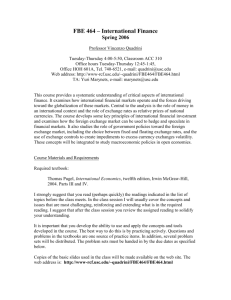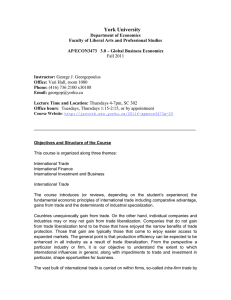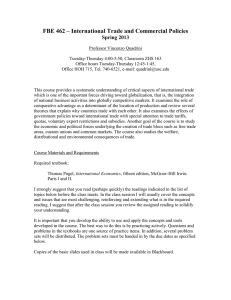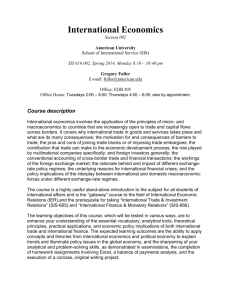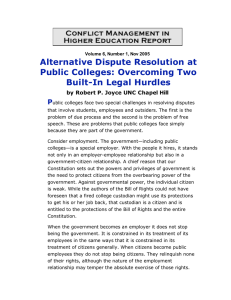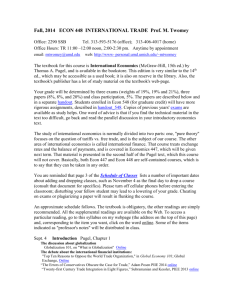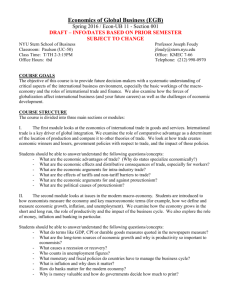Course Syllabus ECO 338 International Economics
advertisement
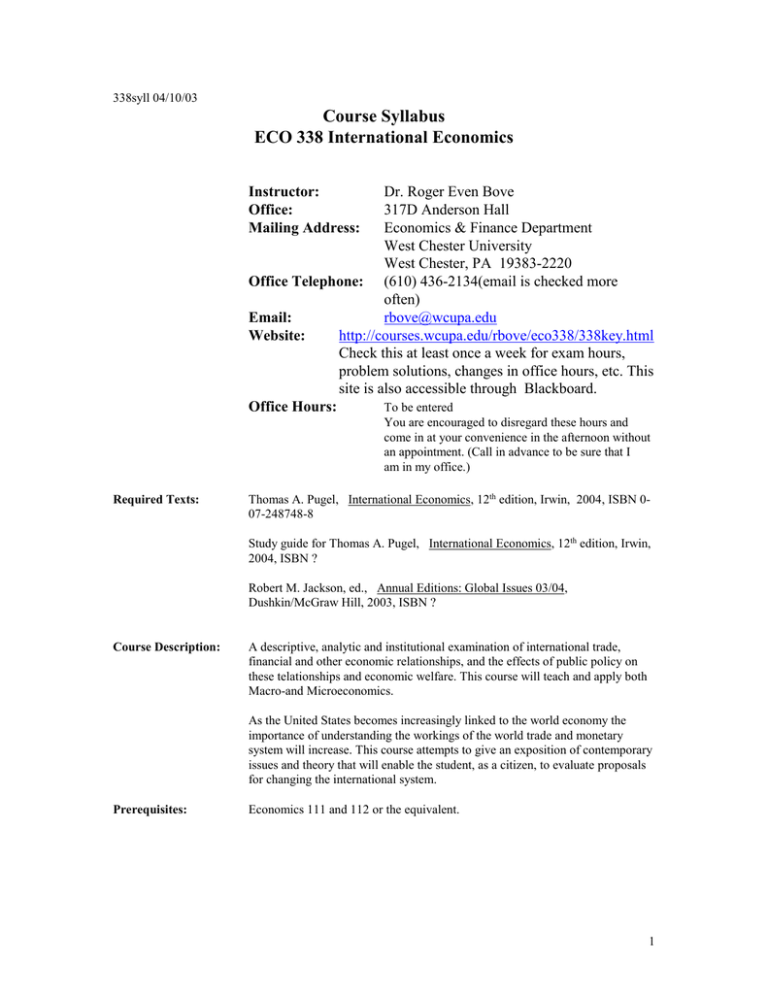
338syll 04/10/03 Course Syllabus ECO 338 International Economics Instructor: Office: Mailing Address: Dr. Roger Even Bove 317D Anderson Hall Economics & Finance Department West Chester University West Chester, PA 19383-2220 Office Telephone: (610) 436-2134(email is checked more often) Email: rbove@wcupa.edu Website: http://courses.wcupa.edu/rbove/eco338/338key.html Check this at least once a week for exam hours, problem solutions, changes in office hours, etc. This site is also accessible through Blackboard. Office Hours: To be entered You are encouraged to disregard these hours and come in at your convenience in the afternoon without an appointment. (Call in advance to be sure that I am in my office.) Required Texts: Thomas A. Pugel, International Economics, 12th edition, Irwin, 2004, ISBN 007-248748-8 Study guide for Thomas A. Pugel, International Economics, 12th edition, Irwin, 2004, ISBN ? Robert M. Jackson, ed., Annual Editions: Global Issues 03/04, Dushkin/McGraw Hill, 2003, ISBN ? Course Description: A descriptive, analytic and institutional examination of international trade, financial and other economic relationships, and the effects of public policy on these telationships and economic welfare. This course will teach and apply both Macro-and Microeconomics. As the United States becomes increasingly linked to the world economy the importance of understanding the workings of the world trade and monetary system will increase. This course attempts to give an exposition of contemporary issues and theory that will enable the student, as a citizen, to evaluate proposals for changing the international system. Prerequisites: Economics 111 and 112 or the equivalent. 1 338syll 04/09/03 Evaluation Policy: Student progress in this course is determined primarily by grades on two hour exams and a paper. The final exam will be one-third of the grade. The other assignments will be equally weighted. Grading will be on a curve based on numerical scores from these exercises. Regular class attendance and participation is expected and a pattern of absences will be penalized. Examination Policy: University policy is that there is no excused absence from a scheduled examination. Therefore, a scheduled and pre-announced exam which is missed will not be made up, and a grade of an F will be recorded, with the limited exception of cases in which the absence is wholly involuntary and unavoidable, and the reason for which is documented by evidence, which can be verified by the instructor. Practically speaking, such cases normally include only illness attended by a physician or nurse, and unavoidable absence on official University business. Not included would be absences due to “oversleeping”, “change in outside schedule”, “job interview”, “extracurricular club or organization events, “car wouldn’t start”, etc.... If any make-up exams are given. they will generally be scheduled for some time during the last week of the semester. Nevertheless, please talk to the instructor about any such situation. However, if you must be absent from an exam, see the instructor, preferably in advance. Economics and Finance Department Policies: Class Cancellation Policy: In the event that the instructor cancels a class, you will be notified by a note posted on the classroom door and signed by the department chair. If there is any uncertainty, check with the department secretary in Anderson 309. Accommodations: We at West Chester University wish to make accommodations for persons with disabilities. Please make your needs known by contacting me and/or the Office of Services for Students with Disabilities at ext. 3217. Sufficient notice is needed in order to make the accommodations possible. The University desires to comply with the ADA of 1990.” Academic Dishonesty: Academic dishonesty is prohibited and violations may result in discipline up to and including expulsion from the University. Academic dishonesty includes but is not limited to academic cheating, plagiarism, the sale purchase or exchange of term papers or research papers; falsification of information which includes any form of providing false or misleading information, written, electronic or oral. Plagiarism is defined as copying another's work or portions thereof and/or using ideas and concepts of another and presenting them as one's own without giving proper credit to the source. 2 338syll 04/09/03 Nondiscrimination/Affirmative Action Policy: West Chester University is committed to providing leadership in extending equal opportunities to all individuals. Accordingly, the University will continue to make every effort to provide these rights to all persons regardless of race, religion, sex, national origin, ancestry, age, marital status, sexual orientation, disability, or veteran status. This policy applies to all members of the University community, including students, staff, and administrators. It also applies to all applicants for admission or employment and all participants in University-sponsored activities. Any individual having suggestions, problems, complaints or grievances with regard to equal opportunity or affirmative action is encouraged to contact the Director of Social Equity, 13/15 University Avenue, 610436-2433. Sexual Harassment Policy: West Chester University is committed to equality of opportunity and freedom from discrimination for all its students and employees. Based on this commitment and the recognition that sexual harassment is a form of discrimination, which is of a growing concern to the higher education community, the University provides the following policy: Harassment on the basis of sex is a violation of Title VII of the U.S. Civil Rights Act, Title IX of the Educational Amendments of 1972, and of the Pennsylvania Human Relations Act. Because West Chester University is committed to establishing an environment free from discrimination and harassment, sexual harassment will not be tolerated in any form. Upon official filing of a complaint, immediate investigation will be made culminating in appropriate corrective action when warranted which may include termination of the relationship with the University. Sexual harassment is defined as unwelcome sexual advances, requests for sexual favors, or other verbal or physical conduct of a sexual nature occurring when: 1. submission to such conduct is made either explicitly or implicitly a term of an individual’s employment, or of a student’s academic status or treatment; 2. submission to or rejection of such conduct by an individual is used as the basis of academic or employment decisions affecting such an individual; or 3. such conduct has the purpose or effect of unreasonable interfering with an individual’s extracurricular activities, work, or academic performance or creating an intimidating, hostile, or offensive living, working, or academic environment. A complete copy of the University’s Sexual Harassment Policy document, inclusive of the Sexual Harassment Complaint Procedure, may be obtained from the Office of Social Equity. Individuals who believe themselves to be victims of sexual harassment, or who have questions about the University’s policy on this matter should contact the Director of Social Equity, 13/15 University Avenue, 610-436-2433. 3 338syll 04/09/03 Student Learning Objectives The Theory of International Trade Why do nations Trade? Be able to draw Supply and Demand curves for a good and show how they are changed by availability of International Trade. Be able to explain what is meant by absolute and comparative advantage in a good. Be able to draw and use production-possibility curves with constant and increasing marginal costs. Be able to explain community indifference curves and how they interact with production-possibility curves to explain trade. Be able to explain the meaning of Heckscher-Ohlin trade theory and the major challenges to it. Understand some more modern explanations of trade such as intraindustry trade, economies of scale and effects of imperfect competition. How do we describe international monetary transactions? Be able to describe the balance of payment accounts Know what transactions cause credits or debits in the BOP accounts. Understand the major kinds of flow in the BOP accounts and where typical transactions fit into them. Know how movements in the Balance of Payments affect the domestic macroeconomy. Understand the basics of operation of foreign exchange markets including forward markets. Understand hedging and the effect of interest rates on forward markets. Know what is meant by purchasing-power parity Explain the operation of the gold standard and floating and fixed exchange rates Why do countries restrict trade? Know the major arguments for tariffs and quotas and be able to discuss their validity. Be able to use supply and demand curves to show the effects of quotas and tariffs on single –product markets. Be able to describe other methods of restricting trade and their effects. Where did we get our current international monetary system and what are its defects? Know what is meant by the Bretton Woods system – The IMF, World Bank etc. Explain how the pegged rates of the Bretton Woods system broke down and what has replaced it. Begin to understand the present problems of the system and be able to describe some major recent crises and how they were resolved. Know what dollarization means and how it affects the US and the rest of the world. Be able to explain some of the proposals to ‘fix’ the system. What has been the American attitude to international trade and how has it evolved? Know how dominant attitudes changed from predominantly protectionist to internationalist as the nation evolved. Understand some of the effects of the Great Depression and World War II on trade. Explain the development of major trade blocks like the EU and NAFTA. Be able to explain how WTO came to be and what it has accomplished. 4 338syll 04/09/03 How are international trade and factor movements affecting the world economy? Explain the advantages of the multinational corporation and the importance of foreign direct investment. Know the reasons why people migrate and the effect of migration on sending and receiving countries. Be able to explain why so much of the world is opposed to ‘Globalization.’ Know about the relationship of growth on the environment and how the international community is responding to threats to the environment. Fulfillment of Department Objectives 1. Critical Thinking: International Economics is inherently controversial. Students must form intelligent opinions about such issues as restraints to trade, intellectual property, migration and globalization. Exam questions, sometimes prepared, ask students to take a position and defend it with facts and theories learned in the course. 2. Problem solving and Quantitative skills: Students are expected to understand and draw graphs in the theory of international trade and the analysis of restraints to trade. Algebraic models and graphs are used to teach the macroeconomic aspects of the course and students are expected to be able to manipulate these models. 3. Communication Skills: All assignments are expected to be presented in clear business English. In addition to a paper all exams have essay questions. 4. Research skills: Students are required to write a research paper, which must be presented in outline and two drafts. They are expected to do a literature search on the topic and discuss the literature. Data should be assembled and presented as appropriate. 5. Technology skills: All written assignments should be typed using standard word processing packages. Data should be presented using Excel spreadsheets and students are encouraged to use standard statistical packages to analyze data. 6. Understanding of the legal, regulatory and ethical environment of business: International Economics, especially our national rights, obligations and goals in treaties involving exports, imports and the environment are essential to understanding the environment of business. 7. Theoretical and practical knowledge in Microeconomics and Macroeconomics: The course, as currently structured, alternates between applied Microeconomics and Macroeconomics. 5 338syll 04/09/03 COURSE OUTLINE AND READING ASSIGNMENTS ‘Pugel’ refers to both text and study guide. Please read all chapter appendices. Additional readings may be assigned. ‘GI’ refers to Annual Editions: Global Issues 03/04 . I. Topic Introduction A. The Diversity of Nations B. Trends in International Dependence C. The Theory of Trade II. III. International Payments A. The Sources of Payments B. The Balance of Payments C. The Foreign Exchange Markets D. Exchange Systems and the Macroeconomy. Restrictions on Trade A. Static Arguments for Tariffs B. Dynamic Arguments for Tariffs C. Analysis of Tariffs D. Quotas E. Exchange Control Chapters Pugel Ch. 1 GI to be determined Pugel Ch. 2-6 3 weeks Pugel Ch. 15 Pugel Ch. 15 Pugel Ch. 16-19 Pugel Ch. 21-23 2 weeks Pugel Ch. 9 Pugel Ch. 7 Pugel Ch. 8,10 Pugel pp 493-4 IV. The International Monetary System A. Bretton Woods Pugel Ch. 19 B. The IMF Pugel Ch. 20 C. The World Bank Group Pugel Ch. 20 D. U.S. Policy Toward the International Monetary System Pugel Ch. 20 E. Current Problems Pugel Ch. 20 F. Reform Issues Pugel Ch. 24 V. Commercial Policy A. Mercantilism B. Free Trade C. U.S. 1780-1940 D. The Breakdown of Trade E. The Movement to Multilateralism VI. Week Beginning 5 weeks 1 week 1 week Pugel Ch. 10 GI to be determined F. Economic Integration Pugel Ch. 11 Trade and Development. A. Multinational Enterprises B. Backwash C. Investment and Aid D .Migration E. Environment F. Globalization Pugel Ch. 14 Pugel Ch. 13. GI to be determined GI to be determined Pugel Ch. 14 Pugel Ch. 12 GI to be determined 2 weeks 6
